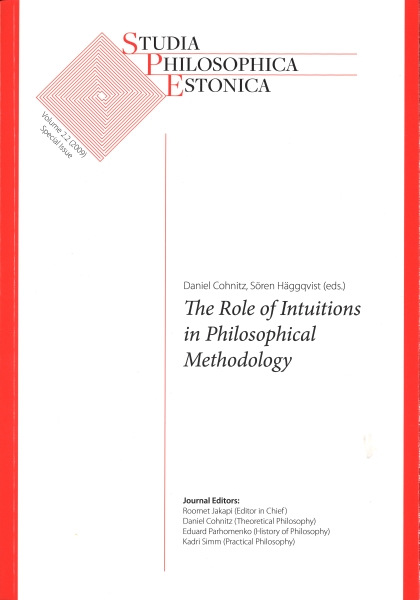Intuitions in Epistemology: Towards a Naturalistic Alternative
DOI:
https://doi.org/10.12697/spe.2009.2.2.02Keywords:
methodology, intuitions, conceptual analysisAbstract
The present paper revisits the main methodological problems with conceptual analysis and considers two attempts to rectify them in terms of prototypes and reflective equilibria, respectively. Finding both wanting for the purposes of epistemological analysis, a naturalistic alternative is then sketched that explores the positive implications of aforementioned problems for the demarcation of the respective roles of intuitions and empirical investigation within three epistemological domains, viz., the evaluation of epistemological hypotheses, the amelioration of epistemic practices, and the construction of a theory of epistemic value.
References
Ahlstrom, K. (2007). Constructive Analysis: A Study in Epistemological Methodology, PhD thesis, University of Gothenburg.
Alston, W. (2005). Beyond “Justification”: Dimensions of Epistemic Evaluation, Cornell University Press, Ithaca, NY.
Bealer, G. (1998). Intuition and the autonomy of philosophy, in M.R. DePaul and W.Ramsey (eds), Rethinking Intuition: The Psychology of Intuition and Its Role in Philosophical Inquiry, Rowman & Littlefield Publishers, Inc., Lanham, MD, pp.201-240.
Bishop, M. and Trout, J.D. (2005). Epistemology and the Psychology of Human Judgment, Oxford University Press, Oxford.
Conee, E. and Feldman, R. (2004). Evidentialism: Essays in Epistemology, Oxford University Press, New York, NY.
Craig, E. (1990). Knowledge and the State of Nature: An Essay in Conceptual Synthesis, Clarendon Press, Oxford.
Daniels, N. (1979). Wide reflective equilibrium and theory acceptance in ethics, The Journal of Philosophy 76:256-282.
Dawes, R., Faust, D. and Meehl, P. (2002). Clinical versus actuarial judgment, in T. Gilovich, D. Griffin and D. Kahneman (eds), Heuristics and Biases: The Psychology of Intuitive Judgment, Cambridge University Press, Cambridge, pp. 716-729.
DePaul, M.R. (1998). Why bother with reflective equilibrium?, in M.R. DePaul and W.Ramsey (eds), Rethinking Intuition: The Psychology of Intuition and Its Role in Philosophical Inquiry, Rowman & Littlefield Publishers, Inc., Lanham, MD, pp. 293-309.
Gettier, E. (1963). Is justified true belief knowledge?, Analysis 23:121-123.
Gigerenzer, G., Todd, P.M. and the ABC Research Group (eds) (1999). Simple Heuristics that Make Us Smart, Oxford University Press, Oxford.
Gilovich, T., Griffin, D. and Kahneman, D. (eds) (2002). Heuristics and Biases: The Psychology of Intuitive Judgment, Cambridge University Press, Cambridge.
Goldman, A. (1978). Epistemics: The regulative theory of cognition, The Journal of Philosophy 75:509-523.
Goldman, A. (1986). Epistemology and Cognition, Harvard University Press, Cambridge, MA.
Goldman, A. (1992). Epistemic folk ways and scientific epistemology, Liaisons: Philosophy Meets the Cognitive and Social Sciences, The MIT Press, Cambridge, MA, pp. 155-175.
Goldman, A. (1999). Knowledge in a Social World, Oxford University Press, Oxford.
Goldman, A. (2001). Replies to the contributors, Philosophical Topics 29:461-511.
Goldman, A. (2007). Philosophical intuitions: Their target, their source, and their epistemic status, Grazer Philosophische Studien 74:1-26.
Goldman, A. and Pust, J. (1998). Philosophical theory and intuitional evidence, in M.R. DePaul and W. Ramsey (eds), Rethinking Intuition: The Psychology of Intuition and Its Role in Philosophical Inquiry, Rowman & Littlefield Publishers, Inc., Lanham, MD, pp. 179-197.
Goodman, N. (1983). Fact, Fiction, and Forecast, 4th edn, Harvard University Press, Cambridge, MA.
Grimm, S.R. (2008). Epistemic goals and epistemic values, Philosophy and Phenomenological Research 77:725-744.
Kitcher, P. (1992). The naturalists return, The Philosophical Review 101:53-114.
Kitcher, P. (2001). Science, Truth, and Democracy, Oxford University Press, Oxford.
Kornblith, H. (2002). Knowledge and Its Place in Nature, Oxford University Press,Oxford.
Kornblith, H.(ed.) (1994). Naturalizing Epistemology, 2nd edn, The MIT Press, Cambridge, MA.
Kripke, S. (1980). Naming and Necessity, Harvard University Press, Cambridge, MA.
Kvanvig (2005). Truth is not the primary epistemic goal, in M. Steup and E.Sosa (eds), Contemporary Debates in Epistemology, Blackwell Publishing, Malden, MA, pp. 285-296.
Latus, A. (2000). Our epistemic goal, Australasian Journal of Philosophy 78:28-39.
Laurence, S. and Margolis, E. (2003). Concepts and conceptual analysis, Philosophy and Phenomenological Research 67:253-282.
Lewis, D. (1973). Counterfactuals, Blackwell, Oxford.
Lycan, W. (2006). On the Gettier problem problem, in S. Hetherington (ed.), Epistemology Futures, Oxford University Press, Oxford, pp. 148-168.
Murphy, G.L. (2002). The Big Book of Concepts, The MIT Press, Cambridge, MA.
Parfit, D. (1984). Reasons and Persons, Clarendon Press, Oxford.
Pritchard, D. (2007). Recent work on epistemic value, American Philosophical Quarterly 44:85-110.
Putnam, H. (1975). The meaning of ‘meaning’, Mind, Language, and Reality: Philosophical Papers, Vol. Cambridge University Press, Cambridge, pp.215-271.
Quine, W.V.O. (1969a). Epistemology naturalized, Ontological Relativity and Other Essays, Columbia University Press, New York, NY, pp.69-90.
Quine, W.V.O. (1969b). Natural kinds, Ontological Relativity and Other Essays, Columbia University Press, New York, NY, pp. 114-138.
Ramsey, W. (1998). Prototypes and conceptual analysis, in M.R. DePaul and W.Ramsey (eds), Rethinking Intuition: The Psychology of Intuition and Its Role in Philosophical Inquiry, Rowman & Littlefield Publishers, Inc., Lanham, MD, pp. 161-178.
Rawls, J. (1971). A Theory of Justice, Harvard University Press, Cambridge, MA.
Rawls, J. (1974/1975). The independence of moral theory, Proceedings and Addresses of the American Philosophical Association 47:5-28.
Rosch, E. and Mervis, C. (1975). Family resemblances: Studies in the internal structure of categories, Cognitive Psychology 7:573-605.
Samuels, R., Stich, S. and Tremoulet, P.D. (1999). Rethinking rationality: From bleak implications to Darwinian modules, in E.Lepore and Z.Pylyschyn (eds), Rutgers University Invitation to Cognitive Science, Basil Blackwell, Oxford.
Shope, R.K. (1983). The Analysis of Knowing: A Decade of Research,Princeton University Press, Princeton, NJ.
Sosa,E. (2007). Experimental philosophy and philosophical intuition, Philosophical Studies 132:99-107.
Swain, S., Alexander, J. and Weinberg, J. (2008). The instability of philosophical intuitions: Running hot and cold on “truetemp”, Philosophy and Phenomenological Research 76:138-155.
Thomson, J.J. (1971). A defense of abortion, Philosophy and Public Affairs 1:47-66.
Weatherson, B. (2003). What good are counterexamples?, Philosophical Studies 115:1-31.
Weinberg, J.M., Nichols, S. and Stich, S. (2001). Normativity and epistemic intuitions, Philosophical Topics 29:429-460.
Williamson, T. (2008). The Philosophy of Philosophy, Wiley-Blackwell, Malden,MA.
Wilson, T. (2002). Strangers To Ourselves: Discovering the Adaptive Unconscious, Harvard University Press, Cambridge, MA.





